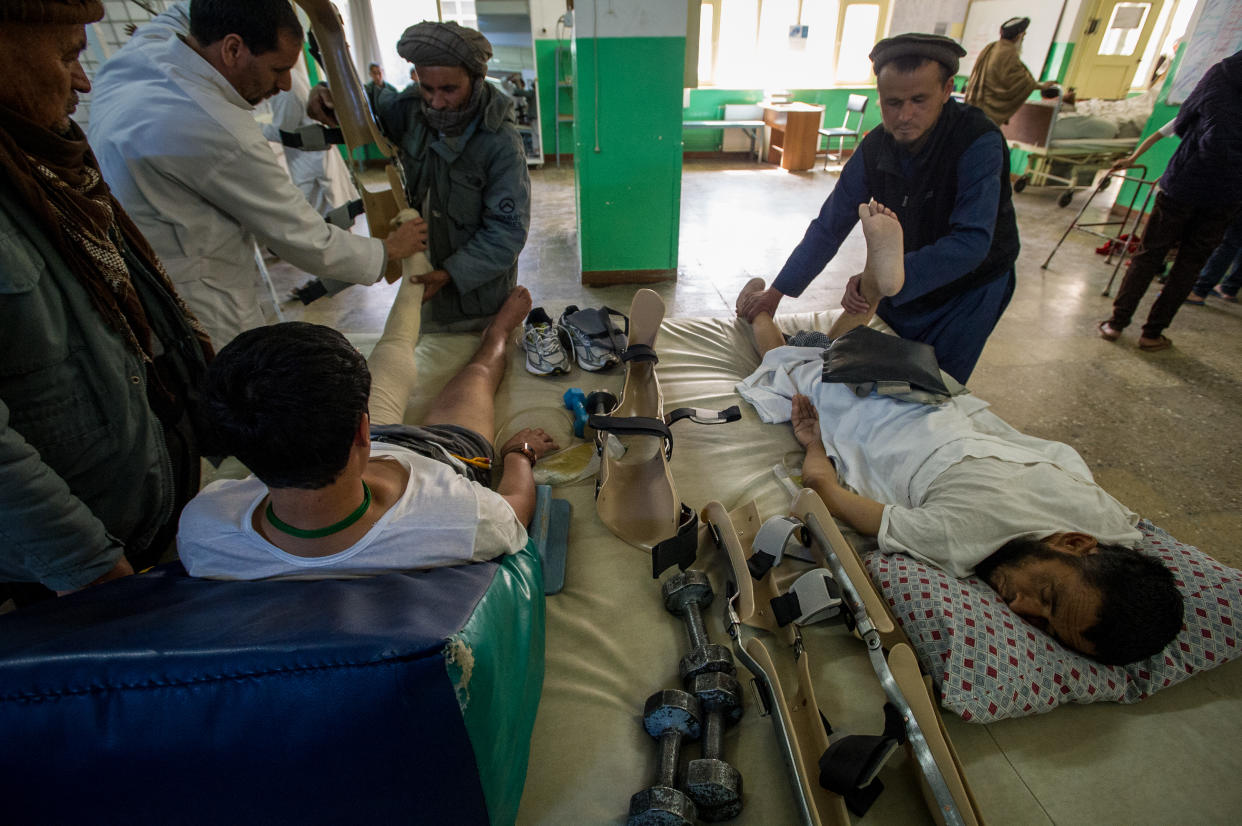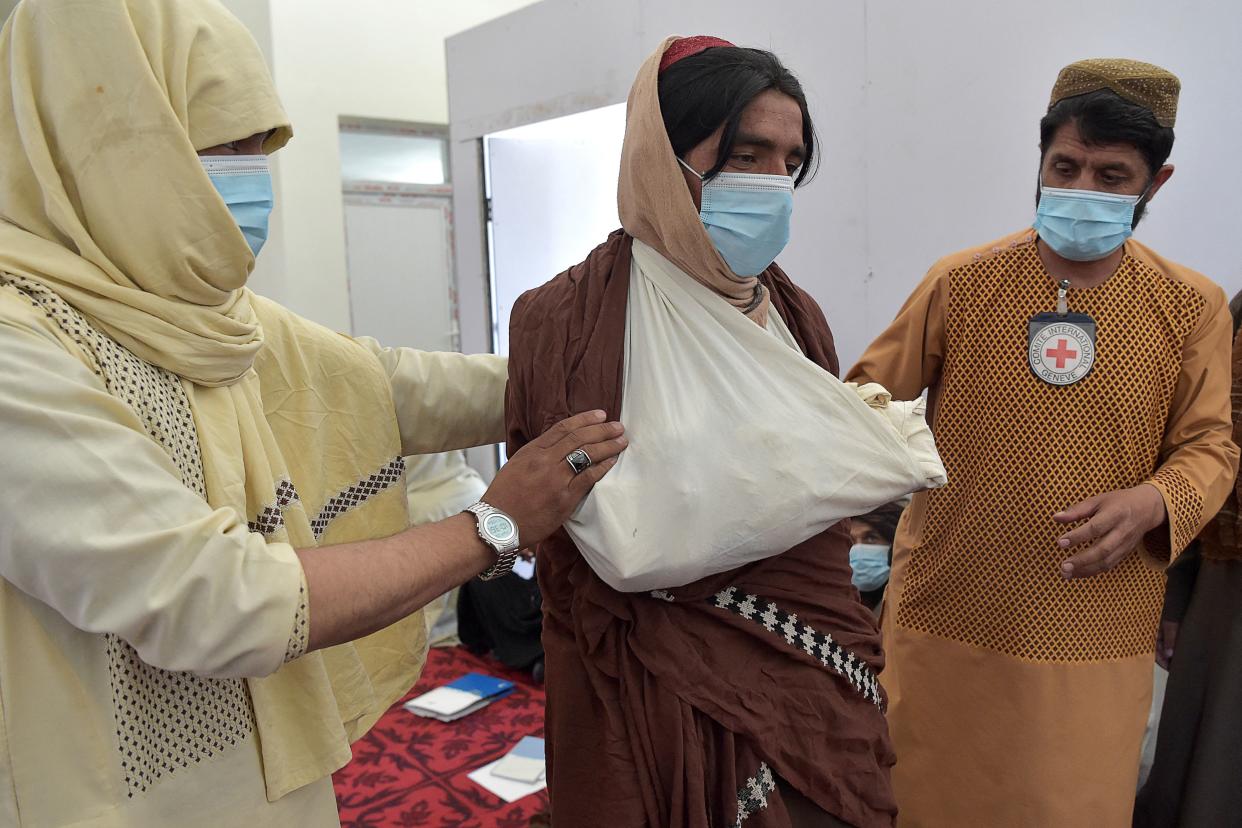ICRC 'does not choose sides': How an international aid group is working to address the humanitarian crisis in Afghanistan
Humanitarian efforts in Afghanistan have waned since the Taliban took over Kabul on Aug. 15, as U.S. troops pulled out of the country, but at least one organization that has worked there for decades says it expects to continue providing assistance.
The International Committee of the Red Cross (ICRC), a humanitarian organization based in Geneva, is one of the largest aid groups working in Afghanistan. The organization has more than 1,800 personnel, made up of both Afghans and foreigners, at 10 sites around the country.
Crystal A. Wells, media and editorial manager of the ICRC, told Yahoo News in a video interview that the group expects to continue working uninterrupted, despite the Taliban’s takeover of Kabul and most of the nation as a whole.
“We’ve worked in areas that they’ve controlled for years,” Wells said. “So today, in many ways, that doesn't change for the ICRC. We will continue to speak to the Taliban, because ultimately we want to continue to provide services to the Afghan people.”

With the Taliban in control and the threat of more attacks following Thursday’s deadly bombing at the Kabul airport, both foreign aid organizations and U.S. forces find themselves at an impasse in helping those in need. The attack claimed the lives of at least 170 people, including 13 U.S. service members. At least 155 others were injured.
U.S. officials say they believe that ISIS-K, an Afghan affiliate of the Islamic State terrorist group, is responsible for the attacks.
On Friday, United Nations officials appealed for $800 million in aid to fill a dire funding gap in Afghanistan.
“Humanitarian needs are catastrophic at large scale and are increasing,” Wafaa Saeed Abdelatef of the U.N. Office for the Coordination of Humanitarian Affairs said at a briefing. “These humanitarian needs are coming from decades of conflict, compounded by drought and COVID-19.”
One-third of Afghan citizens are expected to face hunger if current conditions persist, according to Reuters. Earlier this year, the U.N. appealed for $1.3 billion to help more than 16 million people in Afghanistan, but a nearly $1 billion gap remains.

Many aid groups looking to deliver medical aid, supplies and other assistance have also been slowed by the unrest in the country. But a number of those groups, including the ICRC, had experience working in Afghanistan prior to 2001, when the U.S. ousted the Taliban regime.
“[The ICRC] exists to serve people who are living through war and conflict,” said Wells, noting that the organization “does not choose sides.”
“We have a strictly humanitarian mandate, which is to serve people affected by armed conflict and violence and to provide them with assistance, like medical care, food and water, and make sure that their basic needs are met,” she said.
The group has a history of providing aid to Afghans dating back more than 30 years. And the help extends beyond ordinary Afghan citizens, Wells said, adding that the ICRC also has a “very good working relationship” with the Taliban.
Other humanitarian groups have asked the U.S. for guidance in aiding Afghanistan with two major networks of development and humanitarian aid, InterAction and the Alliance for Peacebuilding. The U.S. Treasury Department has given permission for groups to provide humanitarian aid to Afghanistan, easing concerns that they might end up violating sanctions placed on the Taliban.

In the meantime, U.S. forces remained on high alert Friday for more attacks as they worked to evacuate Afghans and Americans ahead of the Aug. 31 deadline to withdraw from Afghanistan.
Despite the devastation on Thursday, the Biden administration has continued its evacuation effort. According to the White House, more than 12,000 people were evacuated from Kabul in the last 24 hours, via 35 U.S. military flights and 54 coalition flights.
Cover thumbnail: Scott Peterson/Getty Images
_____
Read more from Yahoo News:
'Haiti needs time to breathe' after first devastating earthquake since 2010 disaster
OnlyFans reverses planned porn ban after backlash from its adult-content creators
Defiant parents rail against school mask mandates — even as COVID cases surge
Colleges with no vaccine or mask mandates roil parents and professors: 'I'm terrified'


